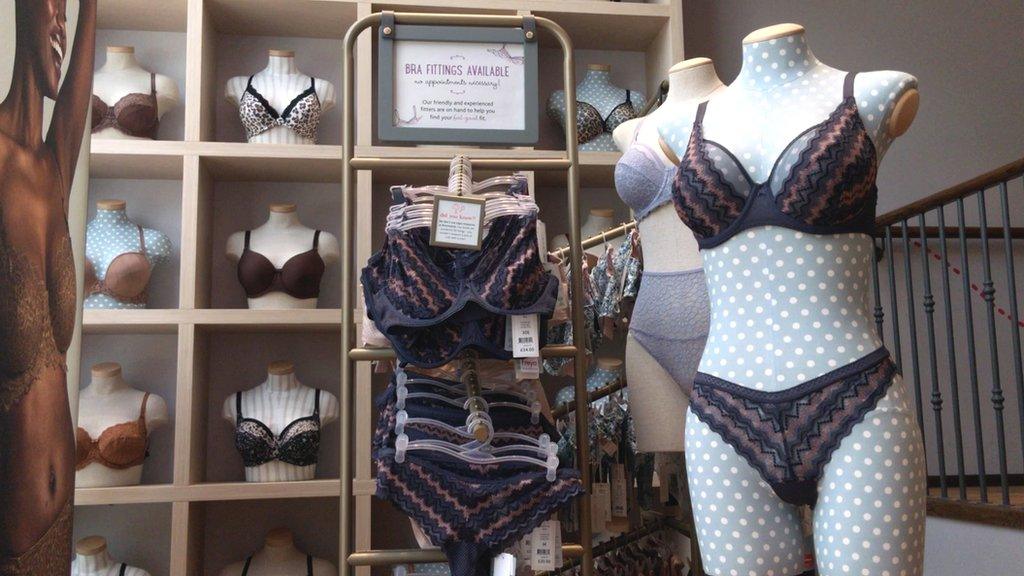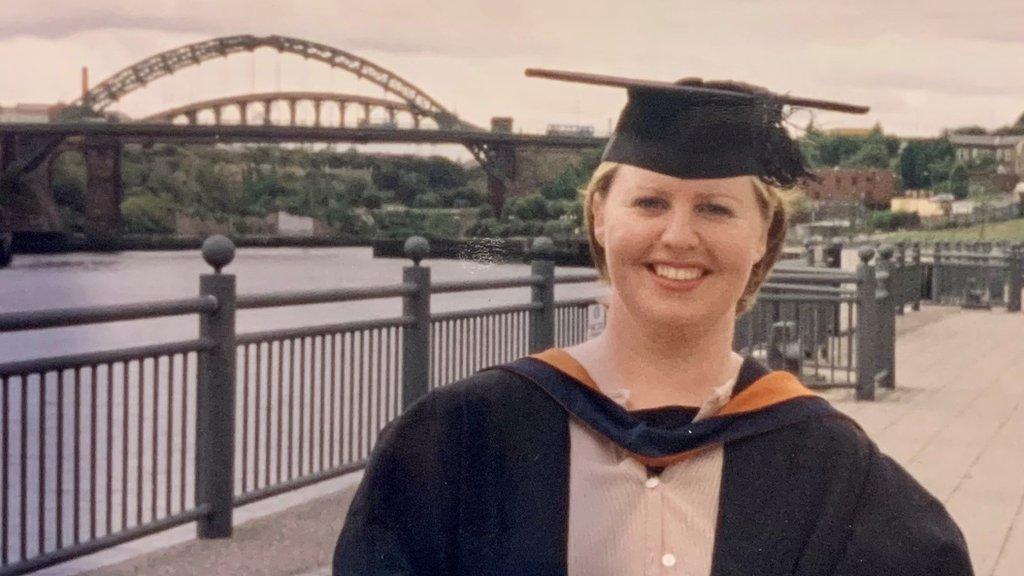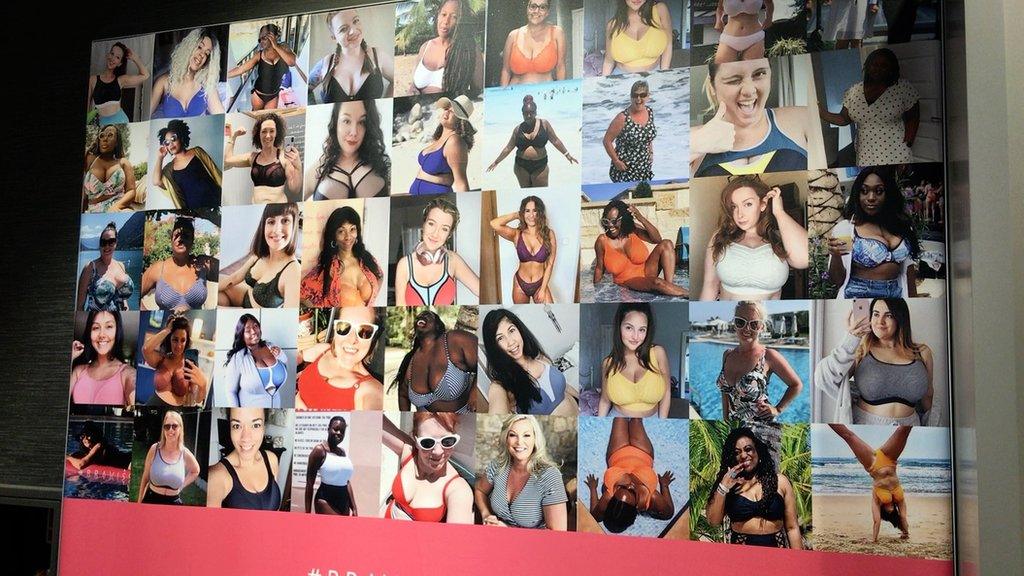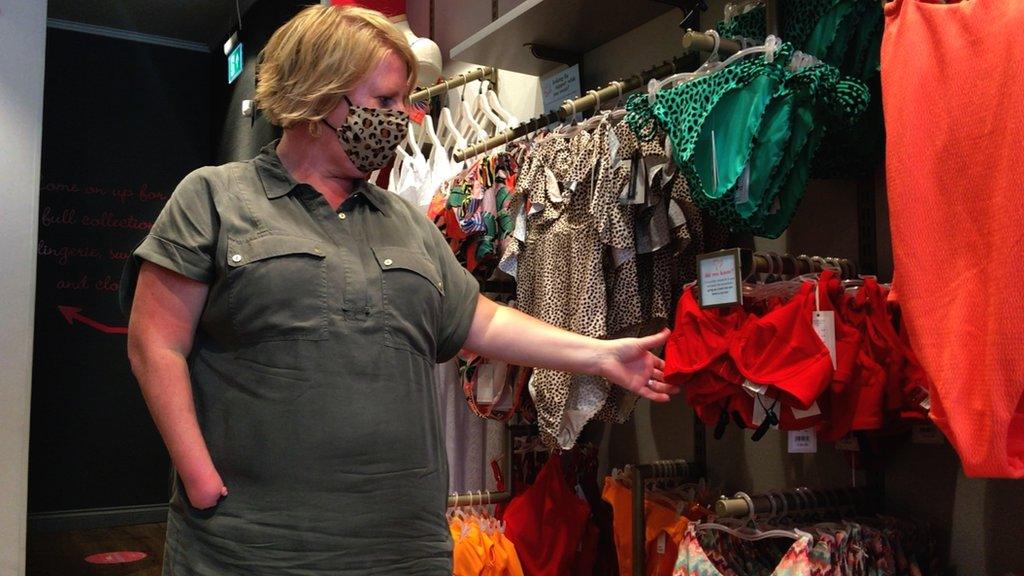CEO Secrets: The bra boss busting stereotypes
- Published
WATCH: Leanne Cahill shares a painful business lesson from her past
Leanne Cahill knows she is a rare breed - a woman from a working-class background, with a physical disability leading a well-known High Street chain.
There are still remarkably few women at the top of the UK's biggest retail businesses, she points out.
"We are overdue a revolution," she has said previously, considering there are no women running retail firms among the UK's top 350, publicly-listed companies.
Ms Cahill's firm, Bravissimo specialises in lingerie for women in larger sizes and launched 25 years ago. It has 26 stores dotted across the UK and had a turnover of £60m, before Covid struck.
The business posted profits of £130,000 in October 2019, down from £1.4m the previous year, after the company invested in US expansion.

The Bravissimo chain specialises in bra sizes of D-cup and larger
The idea of becoming the boss of a multi-million pound company however, seemed far-fetched when Ms Cahill was at secondary school in Sunderland in the early 1990s.
"I had an affinity for maths and numbers, and I was very ambitious," she remembers, "I really wanted to get to the top of whatever I did."
"But if the women aren't there doing it and you're not seeing that, you can't see yourself in that place, it's absolutely a barrier," she adds.
However, it wasn't just business role models she lacked, growing up in a solidly working-class neighbourhood in the north-east of England, it was knowledge of a breadth of careers.
"I didn't actually know anyone who had a professional job. I had no idea what people did in offices."
One defining moment from her school days sticks with her though.
"For the careers session - singular! - we were taken into a room and asked what we wanted to do. The boys were taken to one side, to talk about working in the Nissan car factory. The girls were taken to the other side of the room to talk about Dewhurst's, the clothing factory. It was assumed that's what you'd do."
Her school didn't offer A-levels, so she transferred to a local college and went on to study maths at university, followed by accountancy.
Looking for a "clear line" in to a secure, well-paid job, she considered law and finance. But one incident pushed her firmly towards finance.
"During a tour of law courts I was told, 'of course, you'll have to have elocution lessons if you want to be taken seriously in court'. I thought, 'finance it is then."
In fact, prejudice about her northern accent is something she still encounters to this day.
Recently a consultant called her to propose a meeting. When she answered and took the call, he assumed he had the wrong number. "It was my accent that made them assume I couldn't be the CEO," says Ms Cahill.

Ms Cahill studied Maths at university
After university Ms Cahill joined a management training scheme run by retail chain, Marks & Spencer.
This was very much "hands on, in at-the-deep-end" training, remembers Ms Cahill, and she learned some life-long lessons out on the shop floor
She slowly worked her way up the ladder in to increasingly senior positions, before joining Bravissimo at senior management level in 2017.
Bravissimo was founded in 1995 by Sarah Tremellen, who built the business up from her bedroom. Ms Cahill joined the company as finance director in 2017 and was promoted to CEO in 2020 to help scale the business further.
She says she related strongly to the 'mission' behind the chain that Sarah Tremellen founded - it aims to offer a service for women that traditional clothing departments in large stores do not.
"All our customers have in common is that they are above a D-cup [bra size], and our job is to make them feel confident."
The average bra size for a UK woman is now 36DD, and dress size is 16, but most High Street shops continue to cater much of their stock to the smaller end of the market.
Although the UK remains "streets ahead" when it comes to fashion for women who take larger bra sizes, according to Ms Cahill. Many countries don't have similar, specialist shops, including significant markets like the US, where they have just opened a store, in New York.
"If you are walking into a shop and the experience is, 'Oh, we may have something in your size', and they produce just one bra, you feel marginalised, like there is something wrong with you."
The company has also taken a lead in using photography of larger-sized models, including customers and staff with more average-sized figures.

Bravissimo has championed the use of women who are not professional models
"It's not for the sake of diversity [we use these models], it's to deliver our purpose," says Ms Cahill. "I don't know if we are pioneers, a lot of companies are doing it and it's great."
Ms Cahill has a personal reason to empathise with other women on the issue of body image.
She has a visible, physical disability. She is missing a right hand, which she describes as a "limb difference."
"My hand didn't develop in the womb. There can be physical or environmental causes for this. In my case, my parents didn't know about it until I was born.
"I don't think I've faced prejudice because of this, but it has impacted me, though not in the way people assume," she explains.
"There are extra challenges, you have to do things a different way. Doing things for the first time is always harder, but you build capabilities that are nothing to do with the physical. So, I'm very resilient, I can absolutely bounce back from tough things, I do it all the time.

Ms Cahill has worked at businesses like Travelex, Boots and Marks & Spencer during her career
You also have to be creative, she adds, because you have to find different, unconventional ways to do simple tasks, that are straight-forward for many people.
"It gives you self-confidence in a different way, and that's possibly more relevant in business and leadership as it is in everyday life," she says.
"This is the conversation that people don't have about disability," she says. "People who have that life experience can bring a lot because of the other capabilities they've developed, that's the positive side. It's added so much to my mindset and character."
While Ms Cahill lacked women role models when she started out, she now has almost the opposite problem.
Six out of seven people in her leadership team are women. Women make up more than 90% of Bravissimo's staff - not surprising, since many started off working as bra-fitters, an intimate role where fitters work one-on-one with customers to help them select bras, swimwear and lingerie.
So, does leading a team of mainly women mean you have to be a different kind of leader?
"I am very conscious of working harder to inspire confidence and talk about mistakes and then be part of the learning process," says Ms. Cahill.
"It's funny, when we talk about gender diversity, we [Bravissimo] are looking at it from the opposite angle - we are thinking we could do with more guys!"
You can follow CEO Secrets producer Dougal on Twitter: @dougalshawbbc, external